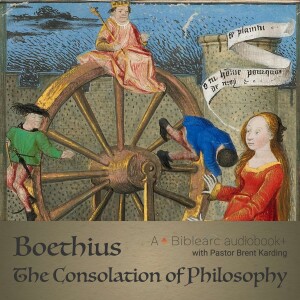
Chapter Summary
Philosophy answers Boethius’s challenge. First, she states that everything that happens in the universe originates in the unchanging divine mind, who plans everything that happens. This plan is called Providence when viewed from God’s perfect perspective as a whole, but Fate when viewed by man’s limited perspective as it occurs. Providence is God’s perfect plan, while Fate is God’s carrying out that plan in time. Therefore, the second aspect depends on the first. Even though some of God’s purposes are impossible for us to understand because we cannot view the whole, those purposes do exist, and move everything in the universe toward the Good. God deals rightly with every human being, according to what he knows he needs, whether that means giving adversity to a person who appears just but is not, withholding adversity from a just person, giving adversity to a just person to increase his virtue, giving adversity or blessings to a wicked person either to destroy him or heal him (and only God can make an evil person good). Human beings must accept the fact of God’s guidance of all things toward the Good, because no one can fully grasp or explain all that God does.
About The Consolation of Philosophy
Written in the 6th-century from a prison cell as the author awaits execution for a crime he did not commit, The Consolation of Philosophy is a dialogue between Boethius and a mysterious woman—Lady Philosophy—who helps him rediscover wisdom and virtue.
Subscribe now and begin walking the path of wisdom with us.
 Want to go deeper?
Want to go deeper?
You’re invited to join the companion course that dives deep into each of the five books. There, we’ll explore each chapter, with guided readings, discussion prompts, and study tools to enrich your journey. Enroll today.
No comments yet. Be the first to say something!